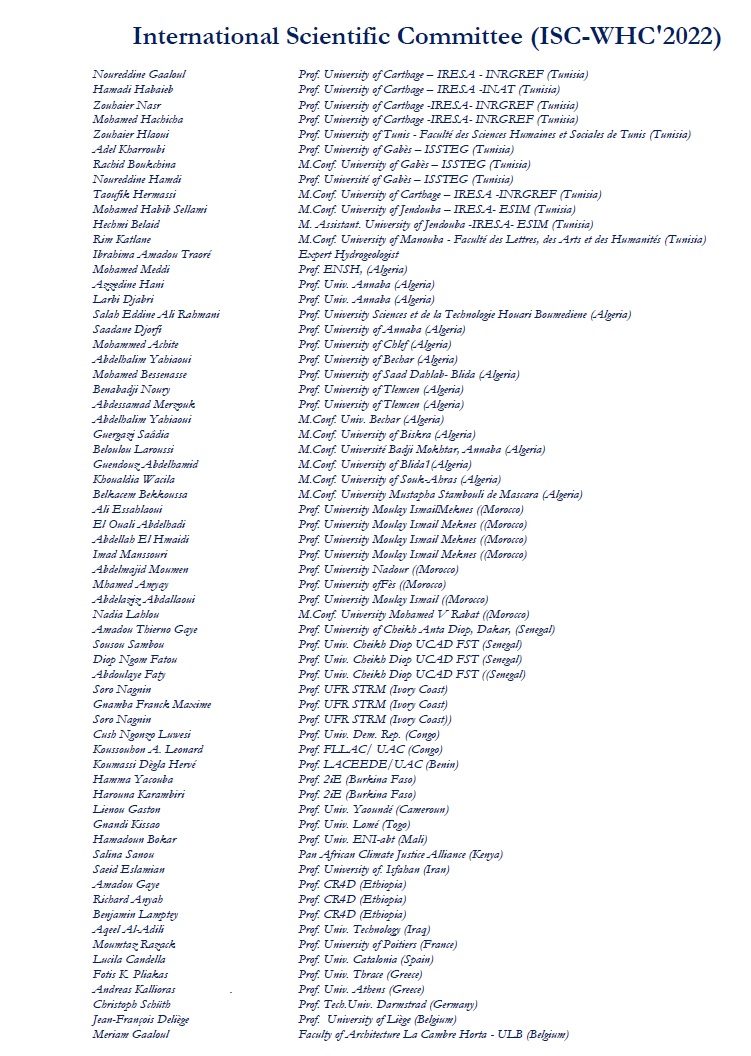
About the Journal : International Journal Water Science and Environment Technologies (IJWSET) is a Open Access, Fully Refereed and Peer Reviewed international Journal. Notably, it is a Referred, Highly Indexed. International Journal covering all of the Water and Environmental Sciences, including different disciplinary and emerging research fields. International Journal Water Science and Environment Technologies (IJWSET)is a quarterly journal and publishes original articles, review articles, case studies and short communications on the fundamentals, applications and Technologies of water and environment. We also host International Conferences to publish their research work. International Journal Water Science and Environment Technologies (IJWSET) covers all disciplines including Water, Environment and Climate Change. International Journal Water Science and Environment Technologies (IJWSET) always strives to be a platform for Academicians, New Researches, Authors, Engineers, Technocrats and Engineering Scholars. Since inception, International Journal Water Science and Environment Technologies (IJWSET)is continuously publishing original and best quality research articles. The IJWSET was founded in 2014 by Professor Noureddine Gaaloul, University of Carthage, IRESA, INRGREF, Tunisia.
International Journal Water Science and Environment Technologies
Indexation : ISSN Online: 1737-9350 ISSN Print: 1737-6688
Open Access , Peer Review Mechanism, Fast Publication (40-90 Days)
![]() : jistee@iresa.agrinet.tn et en Cc
: jistee@iresa.agrinet.tn et en Cc ![]() : jistee@yahoo.com
: jistee@yahoo.com
 Volume (VII) : Eau-Santé-Climat’2021 / Water-Health-Climate’2022
Volume (VII) : Eau-Santé-Climat’2021 / Water-Health-Climate’2022 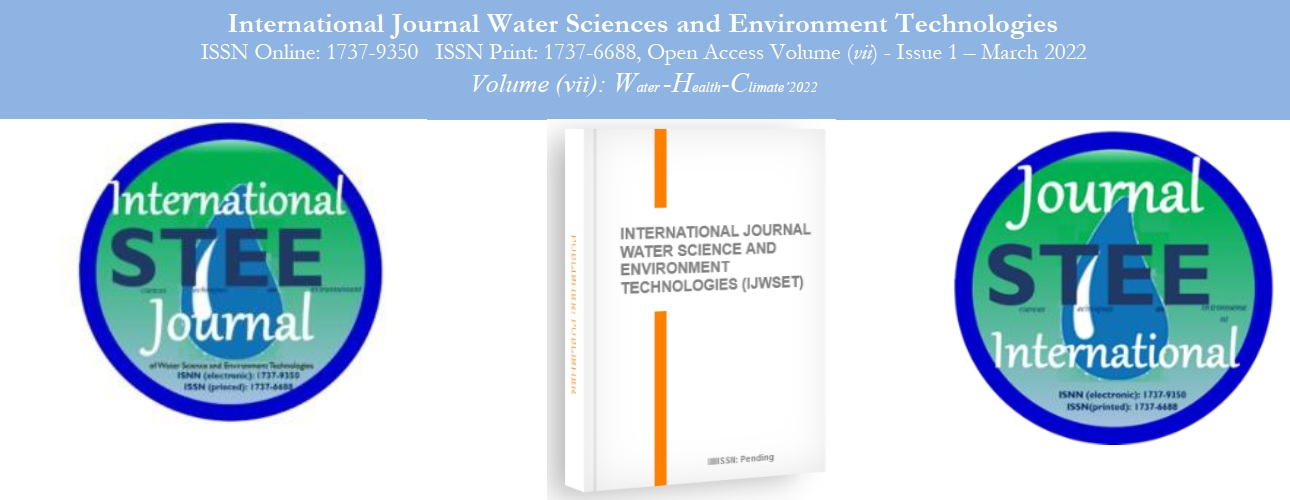
Issue 1 (7 Articles) – March 2022 : Climate change: What effects on our health?
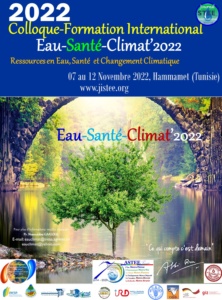
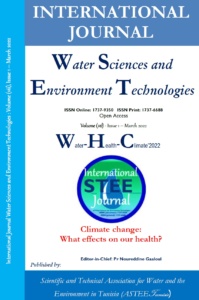
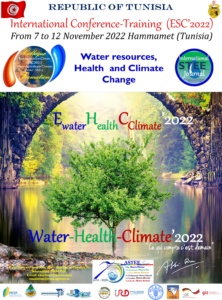
Numéro 2 (?? Article) – Juin 2022 : Issue 2 – June 2022
Call for contributions: Next issue of the Scientific review: JISTEE – June 2022. International Journal Water Science and Environment Technologies (IJWSET) invites you to submit your research work through Email jistee@iresa.agrinet.tn and Cc : jistee@yahoo.com
Make sure that the submitted manuscript should not have been submitted or published previously anywhere else for publication. It is strictly advised to submit original and plagiarism free articles only for possible consideration; else they will be rejected without any response. All received manuscripts will go through Double Blind Peer Review and final decision shall be based on the high level of quality. Originality and additional contribution to the existing knowledge.
Very Important: Once your article is submitted to International Journal Water Science and Environment Technologies (IJWSET), you cannot submit / present this paper anywhere else, unless your article is rejected by International Journal Water Science and Environment Technologies (IJWSET). Accepted submission will not be withdrawn or be presentable in any other Journal / conference /magazine or any media without written permission of International Journal Water Science and Environment Technologies (IJWSET).
 Nous coordonnons la rédaction, du numéro mois de Mars 2022 “ Eau- Santé – Climat“, (ESC-2022), qui vous est ensuite offert gratuitement en format pdf.
Nous coordonnons la rédaction, du numéro mois de Mars 2022 “ Eau- Santé – Climat“, (ESC-2022), qui vous est ensuite offert gratuitement en format pdf.
Le thème retenu pour 2022 est “ Eau- Santé – Climat“, en vous rappelant, si besoin en était, que le changement global couvre à la fois le changement climatique et les changements anthropiques (variations d’occupation des sols et aménagements des bassins versants, prélèvements, etc.).
Nous lançons donc un appel à contributions pour des articles (articles longs, courts, encadrés) qu’il vous paraîtrait intéressant de voir figurer dans ce numéro de la revue Scientifique : Journal International Sciences et Techniques de l’Eau et de l’Environnement (JISTEE).
Les contributions seront attendues pour le courant du mois de Mai 2022 afin de pouvoir être révisées par le Comité Scientifique International et que la mise en forme du numéro ait lieu en Mai 2022 au plus tard.
Visiter notre site : https://jistee.org/journal-international-sciences-et-techniques-de-leau-et-de-lenvironnement/
http://jistee.org/journal-international-sciences-et-techniques-de-leau-et-de-lenvironnement/
Call for contributions: Next issue of the Scientific review: JISTEE – June 2022
International Journal of Water Science and Environment Technologies
We are pleased to inform you that the Vol 7, No 2 of International Journal of Water Science and Environment Technologies is available at https://jistee.org/volume-vi-2022/
Open access Journal are freely accessible via the internet for immediate worldwide. This Journal is an Open Access International Journal and will accept research and review manuscripts ranging from, Basic research on Water, Climate, Environment, Hydrology; hydrogeology and management of water resources; Agricultural hydraulics (Irrigation, Drainage, etc.), Modeling of Water Resources (Hydraulics, Hydrology, Hydrogeology), Physico-chemical quality of Surface and groundwater; Hydrobiology, microbiology, toxicology and ecotoxicology; the structure and function of aquatic ecosystems; Water quality, wastewater treatment and drinking water; Municipal and industrial wastewater treatment; Management of water resources (quantitative, socio-economic and legal aspects) ,…
The manuscript/ paper can be submitted via email to jistee@iresa.agrinet.tn
to our online direct submission area, located here:
Numéro 3 (??? Articles) – Septembre 2022 : Issue 3 – September 2022
Numéro 4 (.?? Articles) – Décembre 2022 : Issue 4 – December 2022


The health effects of global warming: developing countries are the most vulnerable.Between 2030 and 2050, climate change is expected to generate nearly 300,000 additional deaths per year, increasing child malnutrition and undernutrition, insect-borne diseases, diarrhoea and heat-related stresses. The potential influences of these changes on health are therefore multiple and interrelated. To these damages, it is necessary to add the migration of populations fleeing profound changes in their living environment: decrease in agricultural yields, floods, sea level rise…. Nearly 250 million “climate refugees” are expected at the horizon of 2050. Everyone remembers the excess of mortality in Europe during the heat wave in the summer of 2003, whereas 70,000 deaths were recorded in August alone. The climatic effects on infectious diseases are more complex. But entomologists are convinced that the expansion of hot and humid areas on the surface of the globe would increase populations of virus-carrying insects tenfold. Finally, the economic impacts of climate change speak for themselves: the estimated cost of direct health damage is estimated at between $2 billion and $4 billion per year by 2030.
The temperature has increased by about 0.85°C worldwide over the past 130 years. This increase is mainly due to the increase in greenhouse gases. Over the past 25 years, the rate has accelerated and we are at more than 0.18°C of warming per decade. Sea levels are rising, glaciers are melting and rainfall distribution is changing. In addition to these factual events, there are global climate changes, which are more complex to measure and which are manifested, among others, by extreme weather events (drought, floods, heat waves) increasing in intensity and frequency (see Tropical Cyclones: impacts and risks). Apart from a few rare effects of climate change that could be considered positive (e. g. reduction in winter mortality in temperate zones), these appear to be harmful to health. For example, the negative impacts of climate change on the yields of most crops can be cited. In their fifth assessment report, members of the IPCC (Intergovernmental Panel on Climate Change) noted many periods of very rapid increases in food and cereal prices following extreme weather events (giant fires, storms, floods).
Besides the visible effects on people’s livelihoods, global warming is predicted to have a strong and adverse impact on human health. The populations of countries that have contributed the least to global warming are the most vulnerable to death and diseases brought about by higher temperatures. The coastlines along the Pacific Ocean and the Indian Ocean and in sub-Saharan Africa will be at higher risk of enduring the health effects of climate change. The World Health Organization (WHO) reports that climate change is responsible for at least 150,000 deaths per year, a number that is expected to double by 2030.
The effects of climate change are already being perceived today and projections for the future represent a potentially catastrophic risk of a magnitude that is difficult to accept for human health. The effects of global warming on human health are in addition to the effects of changes linked to globalization (demographic changes, social change, economic activity).
According to WHO, areas without good health infrastructure, most of them in developing countries, will be the least able to prepare and cope with the situation without assistance. If a major mitigation effort is not undertaken, there will come a time when health systems adaptation (e.g. heat stroke) will no longer be possible. The only responsible attitude now would be a radical change in our economic models and lifestyles in society. It has become a matter of life and death, for humans and for the biodiversity on which their health depends very directly.
Global warming can result in droughts that can worsen living conditions, particularly in Africa. The World Wild Fund has reported that climate change can drastically alter rainfall pattern, and risk water and food supplies for millions. The IPCC report estimates that approximately 75 million to 250 million people in Africa will be without adequate water and will face food shortages by 2020, as crop productivity will decline by about 50 per cent. Rising temperatures could also result in food shortages for 130 million people in Asia.
Noureddine Gaaloul
Professor of higher education and full Researcher in the National Institute of Research in Rural Engineering of Water and Forestry (University of Carthage- IRESA- INRGREF-Tunis).
Founder and Chief Editor International Journal Water Science and Environment Technologies.
President of Scientific and Technical Association for Water and the Environment in Tunisia (ASTEETunisie).

